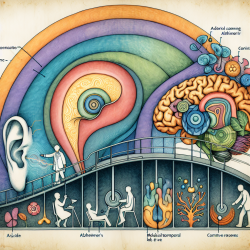As a practitioner working with individuals experiencing hearing loss, it is crucial to understand the potential implications this condition can have on cognitive health. Recent research highlights a significant link between midlife hearing loss and an increased risk of developing dementia. This blog post explores these findings and offers practical insights for practitioners to improve their skills and patient outcomes.
Research Overview
The research article "How Can Hearing Loss Cause Dementia?" by Griffiths et al. (2020) delves into the epidemiological studies that identify midlife hearing loss as an independent risk factor for dementia. The study estimates that hearing loss accounts for approximately 9% of dementia cases. The researchers evaluate several candidate mechanisms that might explain this relationship, such as common pathology affecting both the auditory pathway and multimodal cortex, depletion of cognitive reserve due to an impoverished listening environment, and cognitive resource occupation when listening in difficult conditions.
Mechanisms Linking Hearing Loss to Dementia
- Common Pathology: This mechanism suggests that a common pathology might affect both the cochlea (causing hearing loss) and the brain (causing dementia). However, evidence supporting this is limited.
- Impoverished Environment: Hearing loss may lead to a decreased stimulation of cognitive processing due to an impoverished acoustic environment, negatively affecting brain structure and function.
- Cognitive Resource Occupation: Individuals with hearing impairment may use more cognitive resources for listening, leaving fewer resources available for other cognitive functions.
- Interaction with Dementia Pathology: The study proposes a novel mechanism involving interactions between auditory cognitive processing in the medial temporal lobe (MTL) and dementia pathology.
Practical Implications for Practitioners
Understanding these mechanisms can help practitioners develop strategies to mitigate the risk of dementia in patients with hearing loss. Here are some practical steps:
- Early Intervention: Encourage patients to seek early intervention for hearing loss through the use of hearing aids or cochlear implants. Early treatment may reduce the risk of cognitive decline by restoring normal auditory input.
- Cognitive Stimulation: Promote activities that stimulate cognitive processing, such as social interactions or auditory training exercises, to enhance cognitive reserve.
- Comprehensive Assessments: Conduct thorough assessments that include not only audiometric evaluations but also tests of speech-in-noise perception and other auditory cognitive abilities.
- Patient Education: Educate patients about the potential link between hearing loss and cognitive decline, emphasizing the importance of maintaining auditory health.
Encouraging Further Research
The findings from Griffiths et al. (2020) underscore the need for further research into the complex relationship between hearing loss and dementia. Practitioners are encouraged to stay informed about emerging studies and incorporate new insights into their practice. By doing so, they can better support their patients in maintaining both auditory and cognitive health.
To read the original research paper, please follow this link: How Can Hearing Loss Cause Dementia?










